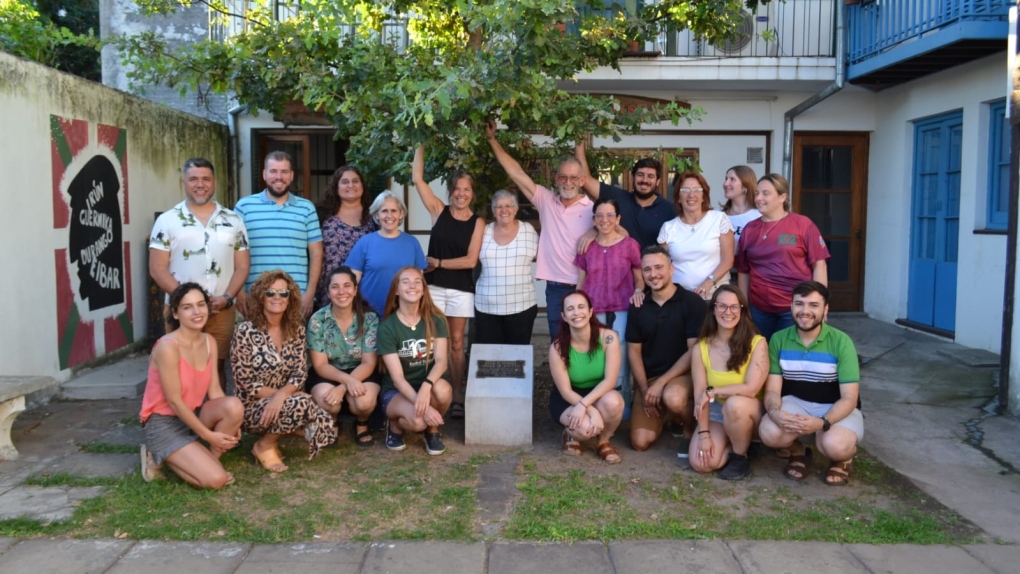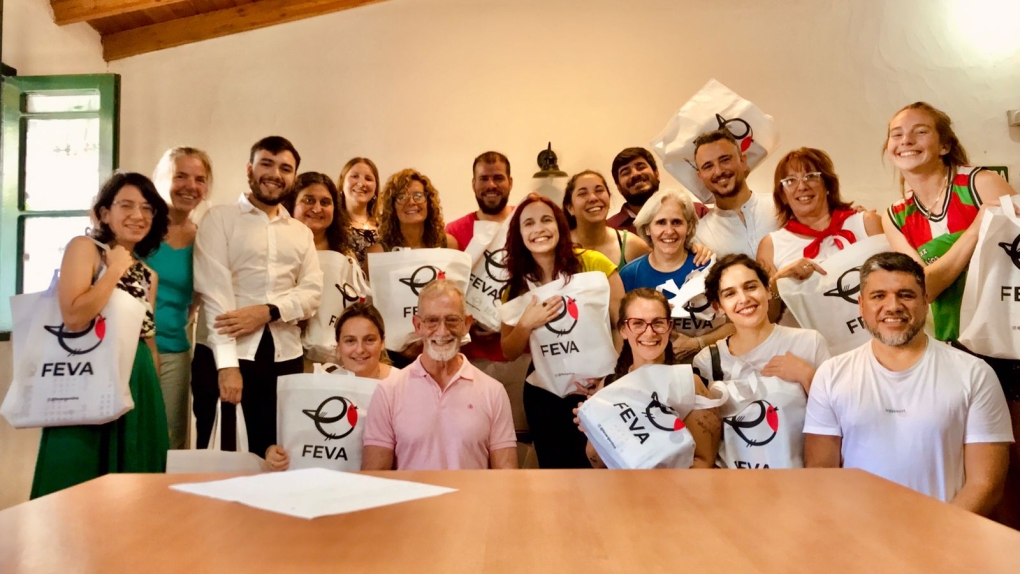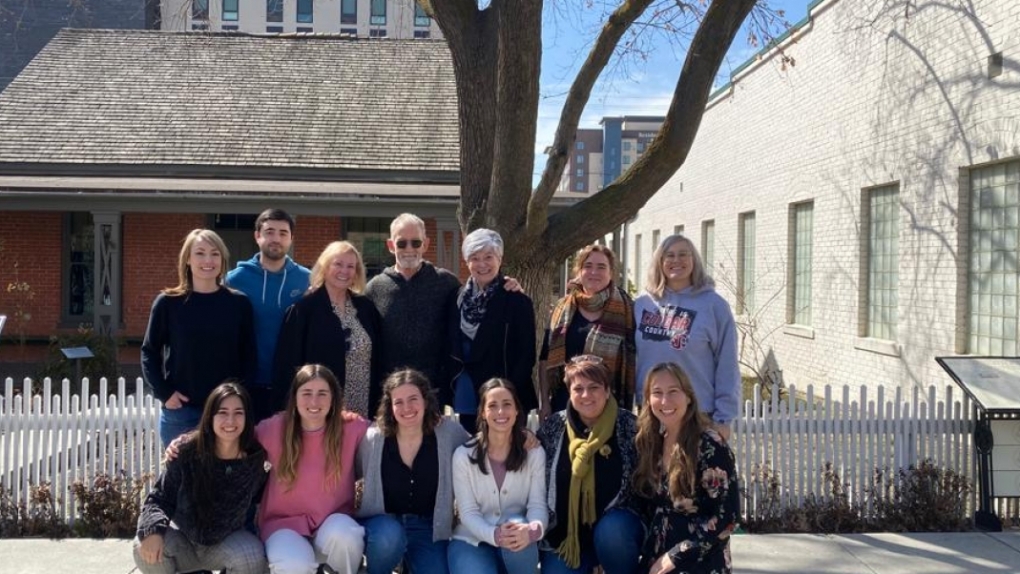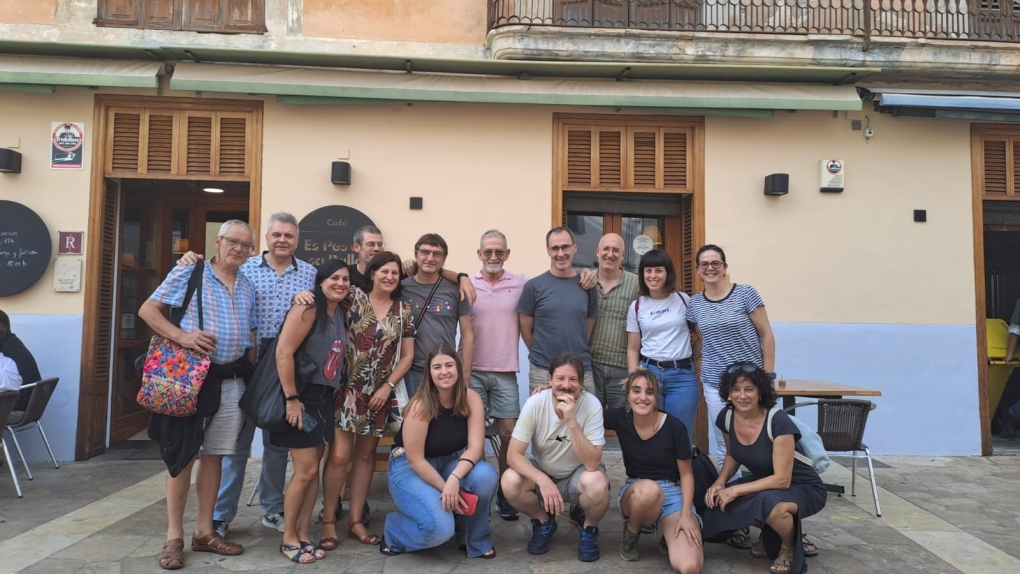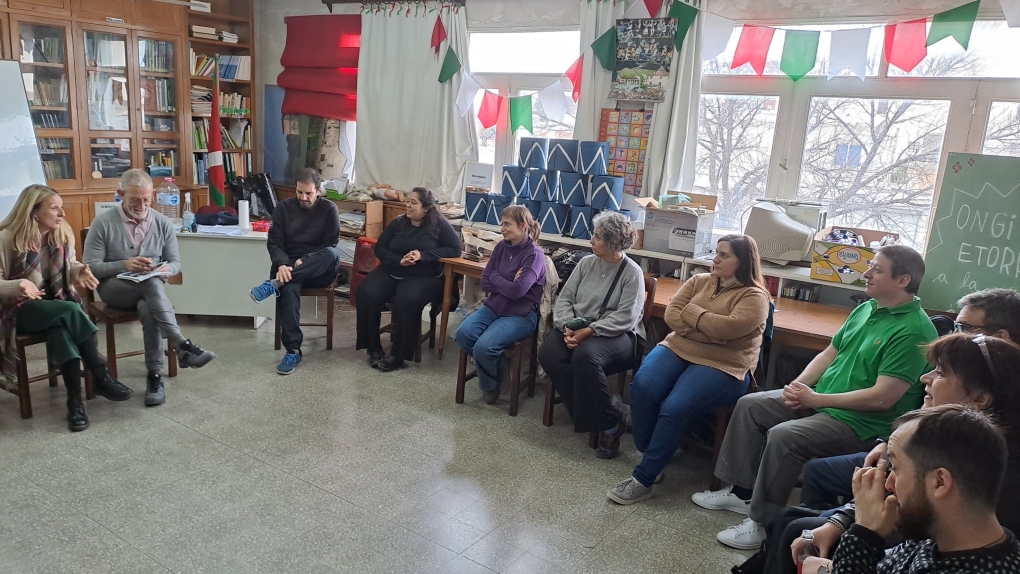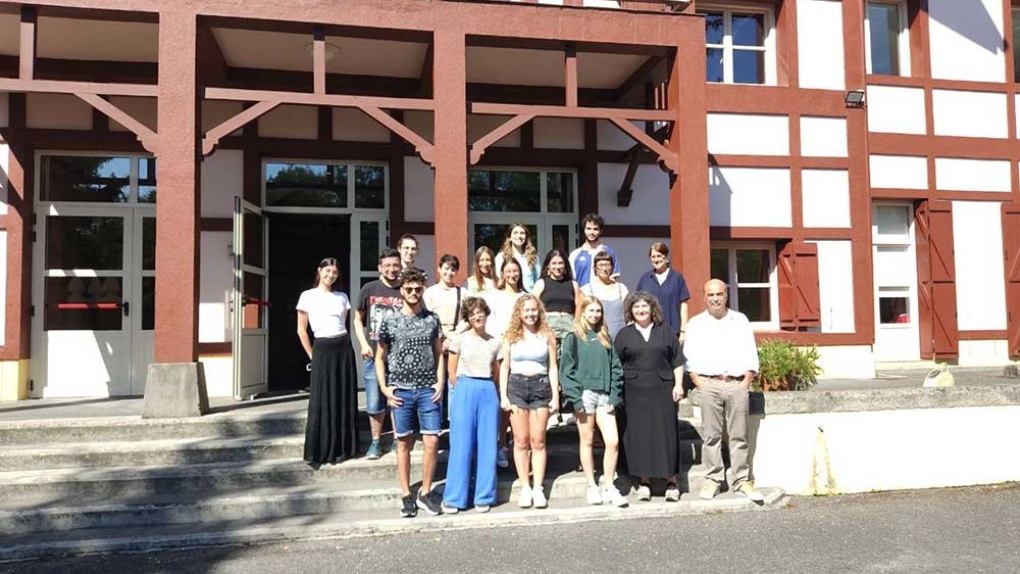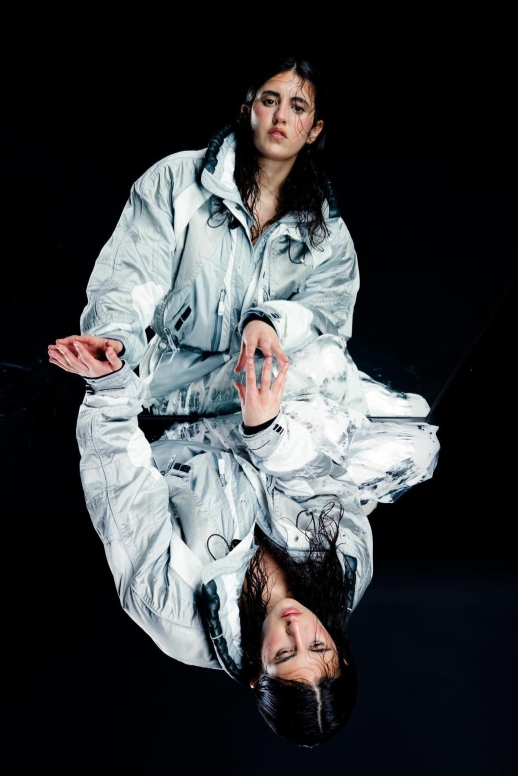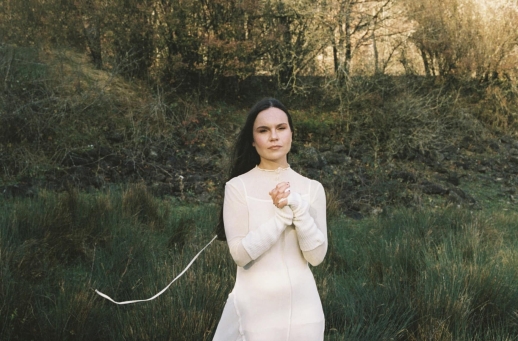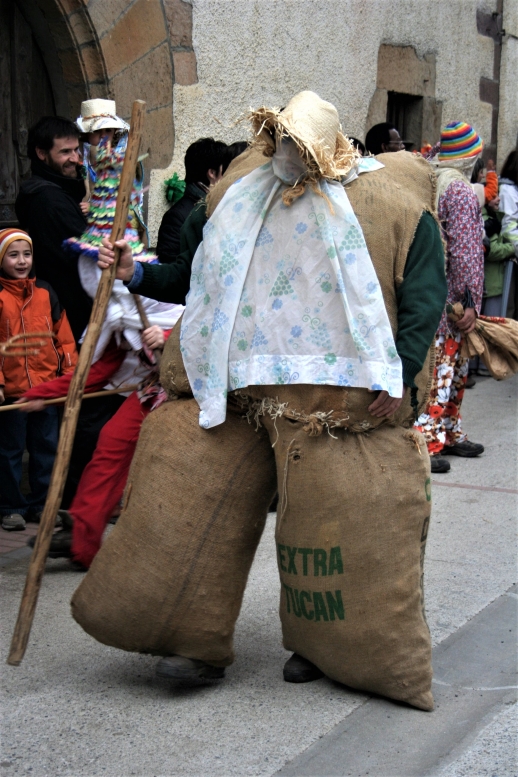Thanks to the Etxepare Basque Institute´s Euskara Munduan programme, dozens of Basque teachers from all over the world have been trained.
After learning Basque from zero, they are now teaching it: "A difficult language? No, not at all".
21 Jun 2024Euskara is difficult, Euskara isn’t really essential, Euskara is pointless: the same old story time and time again. But Begoña, Christian and David, two Latin Americans and a Basque who has spent many years in Valencia, have turned the cliché on its head. They come from different walks of life, experiences and backgrounds, but they do have something in common: all three have taken part in Euskara Munduan, administered by the Etxepare Basque Institute since 2018. One of the goals of the Institute is “to promote knowledge of the Basque language, Euskara, among Basque communities around the world”.
Kinku Zinkunegi Uzkudun oversees Euskara Munduan. “The programme was created with one overarching purpose: to guarantee the presence of Euskara at the Basque centres, or Euskal Etxeak, located around the world. In other words, to offer Basque classes through the centres, and in this way allow anyone who visits them the chance to engage with the language…. In practice it has forced us to take very different paths over the last five years,” Zinkunegi explains, “since the starting points are also very different. Some centres, for example in Europe, already have Basque-speaking teachers, so we don’t have to teach them their own language. In these instances, our primary objective is not only to supply them with the most up-to-date materials but also to equip them with the fundamental principles of teaching the language.”
Most of the teachers in Basque centres in Europe are from the Basque Country and typically have a short-term assignment. This situation “generates a certain lack of stability, as the teacher often changes every year or so,” adds Zinkunegi. However, the Institute also highlights the contrasting situation of Basque centres with "very solid and stable" activity, such as those in Madrid, Barcelona, Bordeaux and Paris. “I should also mention that every year official HABE exams are held in Madrid and Barcelona to certify Basque proficiency levels.”
Approximately 70 Basque centres worldwide, overseen by the Etxepare Basque Institute, provide Euskara classes, with nearly 2,000 students enrolled in total. In the case of South America, teacher training is “much more complex,” explains Zinkunegi. “First we have to make sure they speak Basque.” Once the potential teachers attain the required Basque proficiency level, instructional sessions are arranged "to familiarise them with the teaching materials available and provide essential teacher training”.

In Argentina, there is a particularly strong passion for the Basque language. Why such intense interest? According to the head of the Euskara Munduan programme, "a group of young Argentinians initiated the first course to become teachers. That was the beginning of Argentinan Euskaraz, which would later become Euskara Munduan". At present, the Etxepare Basque Institute´s main challenge is to train teachers in the USA, “in order to create a solid teaching team. We have far fewer teachers there than in South America,” Zinkunegi acknowledges.
Here are three individuals who, having learned Basque from the ground up, have now progressed to teaching the language. What or who inspired them to develop a passion for Euskara and immerse themselves in Basque culture? What has their journey been like? What disadvantages and advantages have they had? In this report, they distinguish between the myths and realities regarding Euskara.
Christian Etxeberria (Santiago de Chile)

Profile Summary. “I was born on May 31, 1982, in Santiago. I am a medical technologist, working in nuclear medicine at an oncology hospital.”
Relationship with Euskara. “I’ve been studying Basque for 12 years. I started in 2012 at the Euzko Etxea in Santiago and in 2013, I enrolled in the Euskara Munduan programme, which enabled me to formally attend Basque classes. In 2019, I passed the level B1 exam and took a break. In 2023, I joined another group as part of the Euskara Munduan programme to prepare for the level B2 exam. In January I went with the group to the Maizpide euskaltegi-barnetegi [full-immersion programme] in Lazkao to improve my language skills. The training process has been quite rewarding – a bit exhausting, yet always enjoyable. At times, I felt overwhelmed with studying, but after taking a deep breath, I’d continue with enthusiasm.”
The story of Grandma Echeverría. “My grandmother was the one who raised me, and her surname was Echeverría. She didn´t know it was a Basque surname. My grandmother was one of the most important women in my life, and when she passed away, I began to research the origin of the surname Echeverría. Until then I didn´t even know the Basque language existed, and it was a nice surprise. So, I learned about Euskara and then decided to study the language. I took my grandmother´s surname, Echeverría, and changed it to the Basque spelling.”
Experiences of an Euskara teacher at the Basque centre in Chile. “What I like most is sharing Basque. Every week we greet each other in Euskara and little by little the students start to use it. I thoroughly enjoy seeing my friends conversing in Basque. Every year we take part in an activity sponsored by the Arriaga Theatre in Bilbao. It involves a collective reading where a diverse range of individuals from Basque society read passages from various books. It´s at the beginning of the school year so at first the students find it really hard to read in Basque. They practise a lot and slowly, improve their speaking skills. I like to see the affection that the students have for the Basque language. Every December, we celebrate the International Day of the Basque Language at the Basque centre. We collaborate in planning activities, such as organising a pintxo competition where nearly everyone participates. It´s a fun interactive experience that allows us to bring the Basque language alive that day.”
Recommendation for someone who wants to learn Basque from zero. “Be patient. Sometimes you’ll learn things quickly, but sometimes it’ll take you longer. Nowadays, Basque classes are usually offered at Basque centres and that´s a good place to start. There are also lots of resources on the Internet, lyrics to songs, dictionaries for mobile phones. The most important thing is to be willing and eager.”
Dabid González (Valencia, Spain)

Profile Summary. “I was born in Barakaldo in 1975 and am a social work technician. When I was a child, I lived in a neighbourhood where Basque was hardly spoken; I come from a non-Basque-speaking family. After living in different countries, 16 years ago I moved to Valencia.”
Relationship with Euskara. “I first encountered the Basque language at school, starting from 6th grade, but to be honest, I didn´t learn much at that time. At the age of 16, I enrolled in the AEK euskaltegi, and it was there that I discovered the world of Euskara. I fell in love with it and learned quite a bit, at least enough to communicate with other Basque speakers. In Valencia my Basque language skills became quite rusty, so I decided to attend classes at the Laurak Bat Basque centre. Before becoming a father, I wanted to have a proficient level of the language to be able to converse in Basque with my children and ensure they learned it properly.”
Encouragement from Germán. “At that time the level of the groups was very low, and I enrolled in the group that was preparing for level B1. In those years more and more people were signing up, and a teacher from Lekeitio, called Germán, convinced me to start teaching in groups of absolute beginners. That was my first experience teaching Basque.”
A self-taught journey. “My training was partly self-taught, but I also took part in the annual Euskara Munduan teacher training programme. It was there that I began to study teaching techniques in depth. Didactics, preparation, creation and use of materials, etc. I’ve also learnt a lot by sharing experiences with teachers from other Basque centres. I’ve been teaching for 11 years and am trying to improve my skills as a teacher. I’m currently teaching a combination B1 and B2 level group at the Euskal Etxea in Valencia.”
Euskal Herria meets Valencia. “A large percentage of the students are from Valencia, predominantly Catalan speakers, who, for various reasons, hold an appreciation for the Basque language. Our students and Basques at the centre have created a small arnasgune, a location where Basque can thrive in the Mediterranean. One of the most precious aspects for a community is the ability to sustain their language. Therefore, the establishment of a Basque Country and a Basque-speaking diaspora is crucial. Here, we also acknowledge the significance of the Valencian language.”
Recommendation for someone who wants to learn Basque from zero. “It´s an effort but it’s worthwhile. Learn gradually, without rushing, and disregard the misconception that it´s an overly challenging language. It may be distinct, indeed very unique, but not necessarily difficult.”
Begoña Muñiz (Buenos Aires, Argentina)

Profile Summary. Begoña Muñiz Etchevers was born Lomas (Lomas de Zamora), in the Greater Buenos Aires region, in 1976. She is 48 years old and works as a translator and teacher.
Relationship with Euskara. “Ever since I was little, I wanted to learn Basque. When I would hear my grandmother speaking Basque, I was very curious and wanted to know what she was saying. When I learnt to write at school, at the age of 6, I tried little by little to write the lyrics of songs I heard in Basque – without understanding anything, of course. In 1990, they started giving Basque classes at Basque centre, and I signed up straight away. I haven´t stopped since then.”
1992, Argentinan Euskaraz. “I had my first experience in 1992 in a full immersion barnetegi in the town of Tandil, Argentina. At that time the programme was called Argentinan Euskaraz, and it was later expanded to Euskara Munduan. In my experience, the training process was incredibly enriching but at the same time challenging. Learning Basque is not as difficult as teaching it, which is much more challenging. Besides, I was very young, and had to teach everything I had learned at the age of 16. I had mixed feelings – eager anticipation and a desire to learn on one side, and shame, fear and insecurity on the other. But I pushed forward and worked hard to learn.”
Positive experience at barnetegis. “We had a great time, we organised excursions and special activities, and spent our summer and winter holidays in Basque. In 1997, we went to the Maizpide barnetegi in Lazkao, staying with local families in their homes. This experience allowed us to immerse ourselves in the village´s ambiance and daily life from an insider´s perspective.”
Lecturer at Universidad de La Plata, with Euskara deep inside. “I started this year teaching at university, so I now teach at primary school, university and online. I´m certainly not bored. To be honest, when I started learning Basque I had no idea that I’d have so much work having to do with the Basque language. At the Euskal Echea school [the only school outside the Basque Country where Basque is part of the curriculum], we teach Basque language and general culture, starting at the age of five.”
Recommendation for someone who wants to learn Basque from zero. “I’d tell them to start learning Basque and to be patient. They should watch television and listen to the radio because that helps a lot. It’s very important to have fun while learning. If you approach it with passion, you learn more easily and doors open for you. Personally, learning Basque has not only made me new friends but teaching Euskara has also become my job.”
